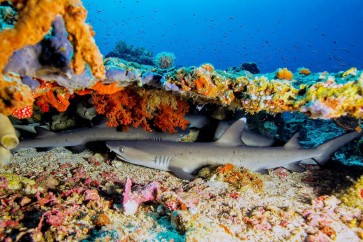Popular Reads
Top Results
Can't find what you're looking for?
View all search resultsPopular Reads
Top Results
Can't find what you're looking for?
View all search resultsBBNJ: Why does it matter to Indonesia?
Environmental damage in the area beyond Indonesia's jurisdiction is hazardous to the marine environment within the country's territory.
Change text size
Gift Premium Articles
to Anyone
“The ship has reached the shore,” president of the conference, Rena Lee, announced at the United Nations headquarters in New York, the United States, on March 5. This marked a historic consensus among parties to the Law of the Sea Convention for the Conservation and Sustainable Use of Marine Biodiversity of Areas Beyond National Jurisdiction (BBNJ) after years of negotiation.
The BBNJ agreement was designed for the protection and sustainable use of marine biodiversity in areas of the ocean that fall under the jurisdiction of no country (high seas) and the seabed and subsoil of the ocean that lies beyond states’ jurisdiction (the area). These areas together are called Areas Beyond National Jurisdiction (ABNJ).
Currently, the ABNJ are largely unprotected and facing multiple threats such as climate change, pollution, biodiversity loss and other threats posed by human activities at sea. The BBNJ agreement is expected to guard the marine environment in the midst of human ambitions to explore and exploit the ocean.
This agreement arguably is the most comprehensive multilateral treaty that incorporates environmental principles, namely a polluter-pays principle, precautionary principle, ecosystem approach, ecosystem resilience, non-transfer of damage or hazard and integrated approach to ocean management.
There are four essential components of the BBNJ agreement. The first is the sustainable use of Marine Genetic Resources (MGRs) and fair and equitable sharing of benefits from such utilization. MGR means any material of marine plant, animal, microbial or other origin containing functional units of heredity of actual or potential value.
The discussions under this part concern the collection of the MGR at sea, the conduct prior to collection, how the benefits can be shared fairly and equitably between developed and developing states and the monitoring and transparency mechanism.
Second, Area-based Management Tools (ABMTs). ABMT means a tool, including a marine protected area, for a geographically defined area through which one or several sectors or activities are managed with the aim of achieving particular conservation and sustainable use objectives in accordance with the BBNJ agreement.



















